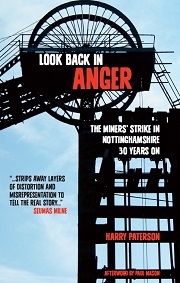Look Back in Anger: the miners’s strike in Nottinghamshire – 30 years on by Harry Paterson (Five Leaves, £9.99)
 On 5th March 1984, following an Area ballot, Cortonwood pit in South Yorkshire came out on strike against the government’s proposed schedule of colliery closures. A domino effect followed, with the Yorkshire, South Wales and Scotland coalfields voting locally to strike. The much-repeated assertion that NUM President Arthur Scargill called for a national strike for reasons of political hubris is the first of many fallacies that Harry Paterson’s timely and unflinchingly powerful book explodes. Likewise the incessant right-wing carping, which continues to this day, that Scargill refused a national ballot; actually, a democratic vote at Conference went against it. The fact that the majority of miners in the UK were already out on strike at this point kind of speaks for itself.
On 5th March 1984, following an Area ballot, Cortonwood pit in South Yorkshire came out on strike against the government’s proposed schedule of colliery closures. A domino effect followed, with the Yorkshire, South Wales and Scotland coalfields voting locally to strike. The much-repeated assertion that NUM President Arthur Scargill called for a national strike for reasons of political hubris is the first of many fallacies that Harry Paterson’s timely and unflinchingly powerful book explodes. Likewise the incessant right-wing carping, which continues to this day, that Scargill refused a national ballot; actually, a democratic vote at Conference went against it. The fact that the majority of miners in the UK were already out on strike at this point kind of speaks for itself.
Thirty years down the line, the miners’ strike remains a raw and emotional subject. Particularly in the Midlands. Every Nottinghamshire pit, most of them by a significant majority, voted to keep working. (Leicestershire demonstrated an equally pro-management stance; read David Bell’s The Dirty Thirty: Heroes of the Miners’ Strike, also published by Five Leaves, for a stirring account of the few men who stuck to their principles and supported their union.) A generation later, communities – families, even – remain divided. That is, where communities exist at all. The aftermath of Thatcher’s deliberate offensive against trade unionism is a country stripped of industry; a country of mass unemployment, of harsh class division, where a job for life is a thing of your father’s, or even your grandfather’s, generation.
My grandfather worked at Annesley. He was born in the last years of the 1800s. He was out in the Great Strike of 1926. He obviously died before the 1984/85 strike. I don’t want to conjecture about what he would have thought of the strike-breaking Notts majority. Even now, reading Paterson’s account, a sense of shame pervades. But to Paterson’s credit Look Back in Anger is more than just Scab: The Book. The opening chapters establish a history of mining and trade unionism in Britain, contrapuntally sketching in Nottinghamshire’s gravitation towards Spencerism and trying to define the prevalent social causes for such a move. Paterson progresses to a labyrinthine tour of the complex functionality of the NUM which – as the strike progresses and the union is increasingly besieged by Thatcherism, the media and the manipulated shift in public opinion – eventually sees the Nottinghamshire Area form the breakaway Union of Democratic Mineworkers. Paterson lays bare the political manoeuvring and dirty tricks that eased the UDM into being in a series of revelations as gripping as any thriller.
It would be disingenuous to suggest that Paterson is anything but on the striking miners’ side, but the steady accretion of new evidence, accounts and documents pertaining to the strike – culminating in papers released earlier this year under the Thirty Years’ Rule – leave no cause for doubt. Thatcher secretly marked 75 more pits for closure than were publicly mooted. At the time, Scargill called her plans “the thin end of the wedge”: history vindicates him.
Look Back in Anger (the title borrowed from John Osborne) is aptly named. To read it is to get mad. Mad at what happened back then. Mad at the fact that it’s still happening now. But the book is also studded with moments which illustrate all that is good and decent in working class men and women. One particular anecdote sums up the principles of solidarity and community that the striking miners were fighting for. A Newstead miner who’d spent his entire adult life at the coalface was on the cusp of reaping well-deserved redundancy benefits. Conflicted by management threats vis-à-vis loss of benefits vs kinship with his striking workmates, the strikers backed him wholeheartedly in returning to work; he saw out his stint, and contributed all his pay pay packets to the strike fund.
Neil Fulwood
